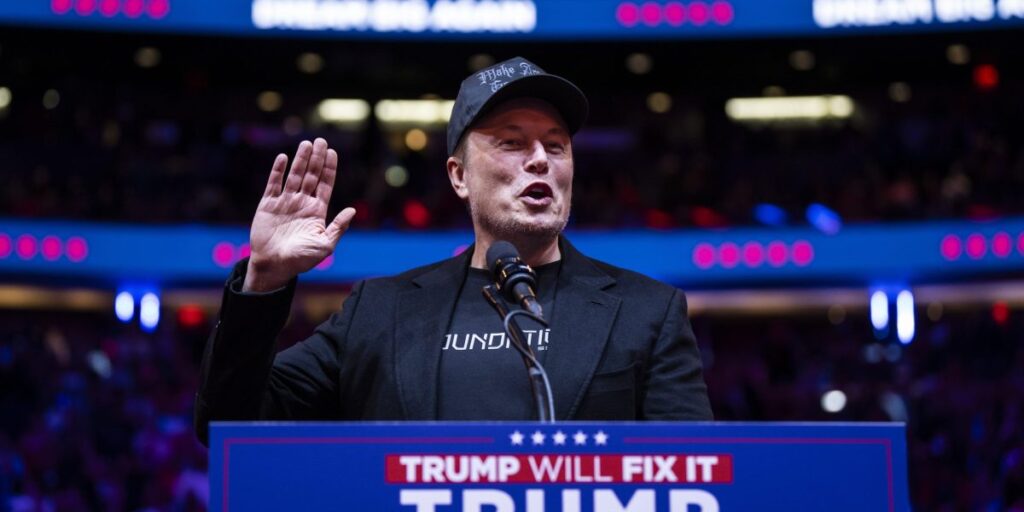[ad_1]

Donald Trump’s election-night address to the country confirmed that one of the evening’s biggest winners—in addition to himself—was Elon Musk.
Trump spent a hefty portion of his scattered victory speech thanking Musk, who has recently spent more than $130 million and a lot of time and tweets to the conservative political cause. In particular, Trump had high praise for Musk’s rocket company SpaceX and its Starlink internet satellites—two business units ripe for government contracts.
“We have to protect our super geniuses,” the president-elect said. On the campaign trail, Trump said he’ll create a new “government efficiency” position in his administration for the tech CEO, at Musk’s request.
Musk is known to cite government overreach in the face of any fine or penalty. So it’s unsurprising that the multibillionaire has tied himself to Trump, who has promised to roll back regulations.
On top of potentially looser government oversight, Musk’s alliance with Trump may help him secure federal contracts. The New York Times reports that SpaceX and Tesla have already racked up at least $15.4 billion in government contracts over the past decade. Musk’s colleagues and government officials told Reuters the billionaire’s investment in Trump is part of a broader effort to shield his companies from regulation and secure access to government subsidies.
Below are just some of the ways each of Musk’s businesses stands to gain from Trump retaking the White House.
SpaceX and Starlink
Tensions between the Federal Aviation Administration and SpaceX are high. In September, Musk called for the resignation of FAA Chief Michael Whitaker over $630,000 in fines levied against SpaceX for violations involving its rocket launches. Musk has said his plans for a department of government efficiency (DOGE) under Trump includes loosening regulations on his rocket launches.
Meanwhile, Starlink, the satellite internet unit of SpaceX, could also get a friendlier reception from the Federal Communications Commission under Trump, assuming the president taps Republican commissioner Brendan Carr to replace current chair Jessica Rosenworcel. Carr has called the FCC’s decision in 2022 to revoke $885 million in subsidies to Starlink “regulatory harassment.” And Trump himself has suggested using Starlink’s satellite services for rural connectivity—a potential financial boon to Starlink—as part of the government $42 billion plan for future broadband funding.
X
Following Musk’s $44 billion takeover of what was once Twitter, the Federal Trade Commission investigated whether X and its new owner were in violation of an existing FTC data privacy agreement with the company. After his acquisition of the service, now known as X, Musk cut its privacy and security compliance teams that were supposed to keep the company in the FTC’s good graces. Last week, Musk promised some payback by saying that FTC Chair Lina Khan would be fired under a Trump administration. Never mind the fact that Trump’s vice president, JD Vance, has praised Khan for being tough on monopolies.
xAI
Musk’s generative AI startup, xAI, has a chatbot that competes against OpenAI’s ChatGPT and other large-language models. Musk is therefore very interested in any regulation that impacts AI.
So far, federal talks about passing a broad regulation of AI companies haven’t materialized. But Musk could still intervene by advising Trump on a lighter-touch replacement to the Biden administration’s AI executive order, a framework for AI use and development that put some restrictions on AI companies.
In California, Musk backed controversial safety legislation, SB 1047, that would have reined in large AI companies. That legislation was fiercely opposed by venture capitalists and large-scale developers, citing the potentially catastrophic risks of artificial intelligence.
Tesla
Federal auto safety regulators last month hit Tesla with a new investigation of its Full Self-Driving mode, which partially automates human driving, after a Tesla driver fatally struck a pedestrian. Musk could use his influence to shape federal auto safety enforcement or the federal regulation of self-driving cars or robotaxis. It’s an area that he cares deeply about, as Tesla hopes to introduce robotaxis to take on more-established competitors like Alphabet’s Waymo and even GM’s Cruise.
Musk could also try to lobby Trump about his opposition to the Biden administration’s electric vehicle tax credits, which incentivize EV purchases.
Trump’s promise to raise Biden’s existing tariffs on China and other competing nations could also be complicated for Musk. Curbing the import of cheaper EVs would eliminate some of Tesla’s competition in the U.S., but escalating a trade war would also hurt tech broadly by disrupting reliance on China and Taiwan for chips.
Whatever the case, investors are hopeful: Tesla stock spiked 15% following Trump’s victory speech.
Boring Company
Musk’s visions for high-speed transit like Boring Company’s Hyperloop project are stifled by regulation and the limitations of current technology. Instead, it has focused on a lower tech version: Teslas ferrying passengers underground near the Las Vegas convention center. The project has faced an OSHA investigation over workplace safety. But despite the high costs, complicated infrastructure, and unsafe conditions, Musk has insisted government regulation is to blame for tunnel projects in some other U.S. cities falling through. In any case, having allies in the U.S. government could make it easier for Boring win major infrastructure projects.
Neuralink
As founder of brain chip company Neuralink, Musk has criticized lengthy approval processes by the Food and Drug Administration for new drugs and medical devices, claiming at one Pennsylvania rally that “overregulation kills people.” It was later reported that the cancer drug Musk was referencing was, in fact, approved. Still, Musk’s vision for widespread “government efficiency” would likely target the FDA, too, and potentially get his Neuralink speedier approvals. So far, Neuralink has implanted brain devices in two patients with FDA approval.
A newsletter for the boldest, brightest leaders:
CEO Daily is your weekday morning dossier on the news, trends, and chatter business leaders need to know.
Sign up here.
[ad_2]
Source link
